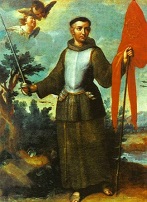
St. John Capistrano
Feast March 28th
(1385-1456)
Born at Capistrano, in the Diocese of Sulmona, Italy, 1385; died 23 October, 1456. His father had come to Naples in the train of Louis of Anjou, hence is supposed to have been of French blood, though some say he was of German origin. His father dying early, John owed his education to his mother. She had him at first instructed at home and then sent him to study law at Perugia, where he achieved great success under the eminent legist, Pietro de Ubaldis. In 1412 he was appointed governor of Perugia by Ladislaus, King of Naples, who then held that city of the Holy See. As governor he set himself against civic corruption and bribery. War broke out in 1416 between Perugia and the Malatesta. John was sent as ambassador to propose peace to the Malatesta, who however cast him into prison. He resolved while still in prison to serve in the future no other interests but those of God. His property was sold at his command, his ransom paid, and from his prison he entered a monastery near Peruse where the Rule of Saint Francis was observed in its purity. The superiors, fearing this vocation to be a passing fancy, tested him severely, even sending him away twice; but he remained day and night at the door, suffering joyfully all trials. His heroic perseverance disarmed their fears and severity, and he was admitted to religious profession.
For seven years he practiced great austerities, cared for the sick in the hospitals, and preached on all sides the word of God. In this, say his biographers, he succeeded so admirably that few preachers in the course of all the centuries can be compared with him. He became a disciple of Saint Bernardine of Siena, assisting him in public conferences and discussions. Like many great servants of God he was calumniated, as though he had taught errors; he went to Rome to justify his teachings in the presence of the Pope and a group of cardinals, which he did admirably well, and they recognized the obvious innocence of the accused Saint.
Afterwards he preached all over Italy, and everywhere brought about the reform of lives. Five Popes in succession gave commissions to this remarkable Franciscan to represent them in important affairs, and he traveled to France, Austria, Poland and Germany. Everywhere his negotiations were crowned with success. But none of the Popes succeeded in raising him to the episcopal dignity; their efforts met an absolute resistance in his humility.
His extraordinary qualities proved to be of great assistance to the Holy See in another circumstance. When Mohammed II was threatening Vienna and Rome, Saint John Capistran, at the bidding of Pope Callixtus III, enrolled for a crusade 70,000 Christians. In a vision he was assured of victory in the Name of Jesus and by the Cross he bore. Marching at the head of the crusaders, he entered Belgrade at the head of the army. This General of the Friars Minor won a remarkable victory in that year of 1455.
When 40,000 of the enemies of the Christians perished, but virtually none among the latter. He himself died the following year at the age of 71. He is regarded as a martyr, for enemies of the faith twice succeeded in giving him poison, which was ineffectual; he died only from the immense fatigue he had suffered in the defense of the city of Belgrade. An infinity of miracles followed his death. He was canonized in 1690.
References and Excerpts
[1] “Lives of the Saints, St. John Capistran,” Magnificat, 7 July 2013. [Online]. Available: https://magnificat.ca/cal/en/saints/sai … stran.html. [Accessed 2 March 2016].
[2] “St. John Capistran,” New Advent Catholic Encyclopedia, 1 October 1910. [Online]. Available: http://www.newadvent.org/cathen/08452a.htm. [Accessed 2 March 2016].